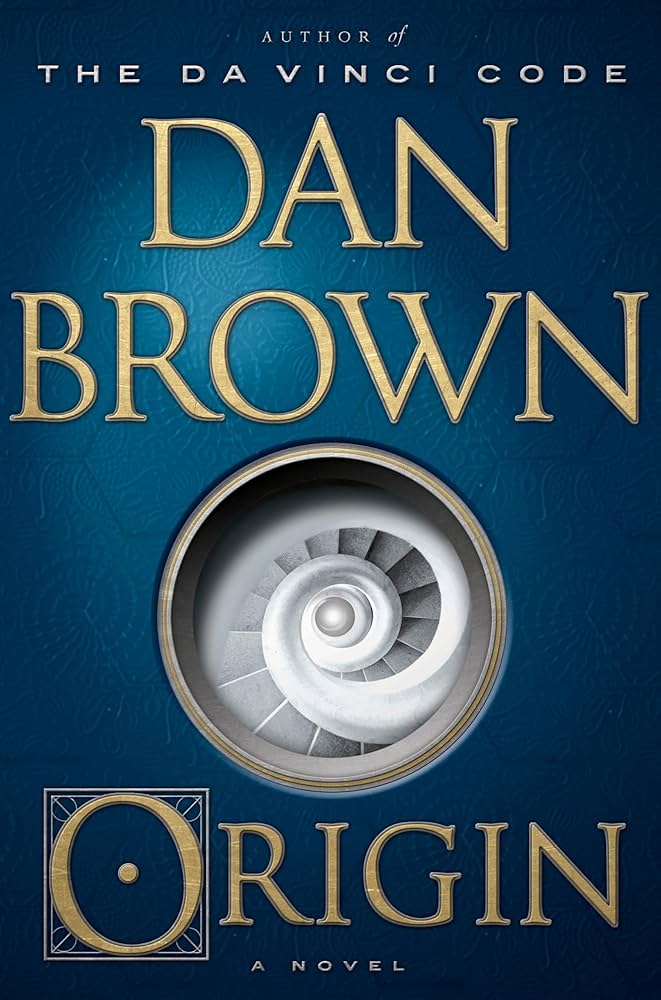I’ve started writing book reviews. Entirely for myself. Only short, 1-2 pages summaries of the book I’ve just read, trying to capture the essence of the work, recording its strengths and weaknesses, and how they may relate to my own writings. This is termed “analytical reading”, an awareness of what the author is doing even as you’re reading the work. How they are creating the setting, introducing the characters, developing plot details, and, perhaps most importantly, establishing the mood for the book, anything from dark and brooding to light and carefree. It is trying to look under the hood to see how the car works, even as you drive it happily down the road.

It was with real reluctance that I recently picked up Origin by Dan Brown, the author of The da Vinci Code (2003). Like most people, I was enthralled by the earlier novel, caught up in the sweeping scale, the monumental settings, the intriguing insights into church and state, a completely new world, or even better, a completely new vision of a world that had been right there in front of us. Yes, the book was a bit long, yes the main character Robert Langdon wasn’t particularly sympathetic, and yes the style and presentation often bordered on the pedantic (which, to be fair, was to be somewhat expected from a Harvard professor of the humanities). But the originality of the book and the fast-moving plot pulled me along, never letting me even consider getting off the train Brown had established, and I came away thinking it was the best book of 2003 and maybe one of the best of the decade.
Then came the sequels. The Lost Symbol (2009) and Inferno (2013), two books that captured all the annoying aspects of The da Vinci Code without the spark and originality. The plots and characters were cut-out copies of the original, and his attempts at cliff-hangers at the end of chapters (“I know where it is!” and still more annoying “You should be able to figure it out!”) became annoying in the extreme. I leave out of this critique Angels and Demons because it was his first work, pre-dating da Vinci Code, and authors have to have some space to develop their styles and techniques. But Brown simply served up the same stale formula for the last two, committing the cardinal sins of all sequels by not further developing main characters or expanding the world. The books just felt like endless extensions of the original with increasingly irrelevant chapters as it plodded on and on. And on.
In The Lost Symbol, it felt like the car was drifting after it dropped its transmission, and Inferno after it dropped its engine.
By contrast, Origin (2017) felt like a real sequel. Brown’s increased use of short chapters made it a page-turner, and yet his writing skills still made those chapters compelling even as they moved the story along. The short timeline also drove the novel, and the speed of the story kept me from needing more development of the characters (when they’re running for their lives, you really don’t want to know about their childhood traumas). Yes, there was the occasional lecture and high-brow digression that color all of Brown’s books, but they were shorter and did not detract from the story…indeed, in a couple of places, they nicely helped to move the plot along rather than just being unnecessary detours.
Oh, the book at 458 pages is still much too long. Brown drags out the last quarter of the book with the same soul-draining detail and digression as the earlier chapters, rather than speeding everything up and rushing to the end. Even The Da Vinci Code was guilty of this literary crime, while the subsequent two books raised larceny to the level of mass-murder. In Origin, Brown poses the fundamental questions of “Where did we come from?” and “Where are we going?”, two highly significant and long-standing questions, and the great success of the book is that the answers he offers are reasonable and somewhat original.
There are LOTS of loose ends floating around as the end nears, so many so that the reader understandably fears that a lot are going to be left dangling – or at least, insufficiently resolved. But he comes up with one common solution that is acceptable if not particularly satisfying.
So, how does this touch on my own works? Well, a major character in Origin is an artificial intelligence named Winston, and he is an interesting contrast to my AI character Mortimer in the upcoming Behind the Web. The two are about as different as a college professor and a construction worker, but they have some nice similarities, addressing similar needs (Origin was written in 2017). There are also some implications for the third work in my series, currently titled Behind the Woods, and I’m right at the stage where those implications are very useful; expanding the plot into wider areas. Finally, while I have been moving towards more of the short 2-3 page chapters, Brown’s skillful use of them has cemented my desire to employ them more frequently. They certainly can drive the story, and you’ll see more of them in my own works.
Leave a Reply